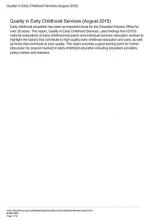Literacy in Early Childhood Services: Good Practice
The intent of the evaluation was to gain an insight and understanding of literacy teaching and learning in early childhood education. This report complements the ERO national evaluation report, Literacy in Early Childhood: Teaching and Learning, February 2011. It presents examples of good practice from 13 early childhood services, identified during their ERO reviews, which had high quality literacy teaching and learning. ERO revisited these services in Term 4, 2010.




